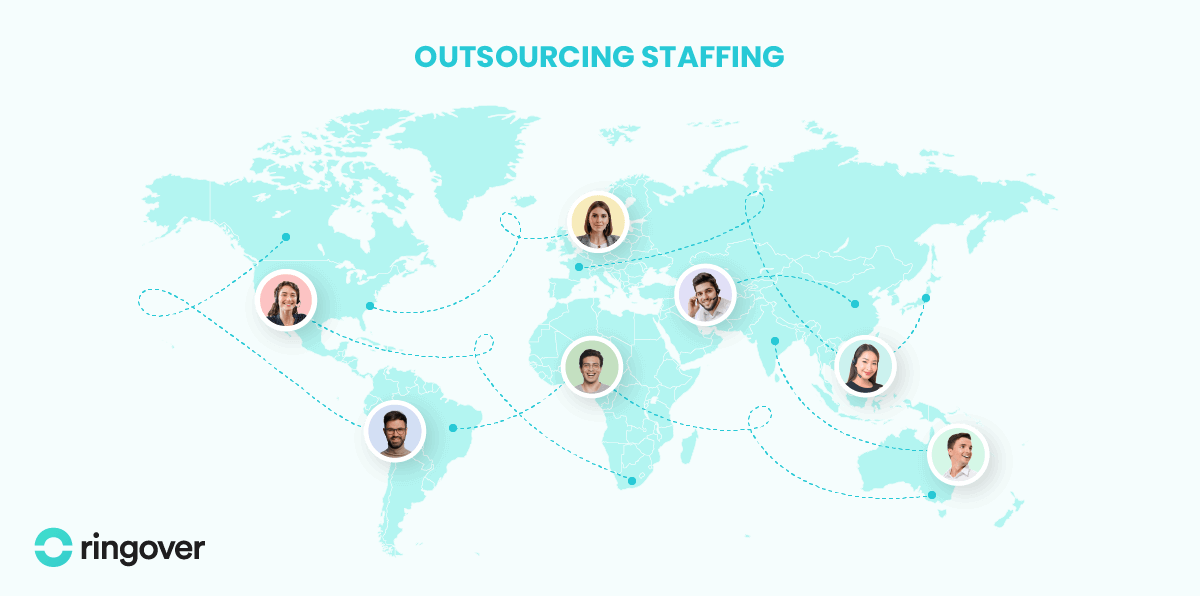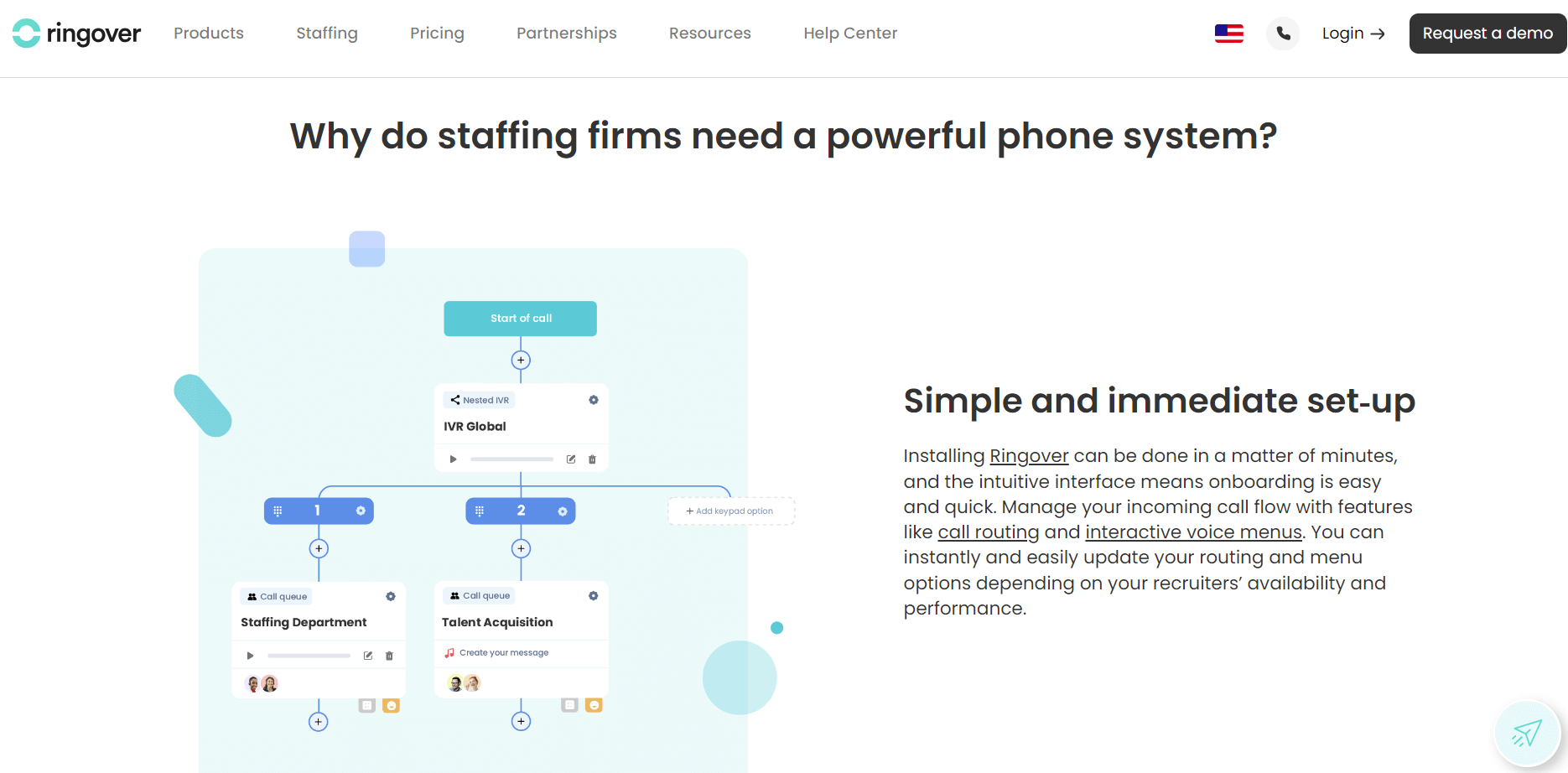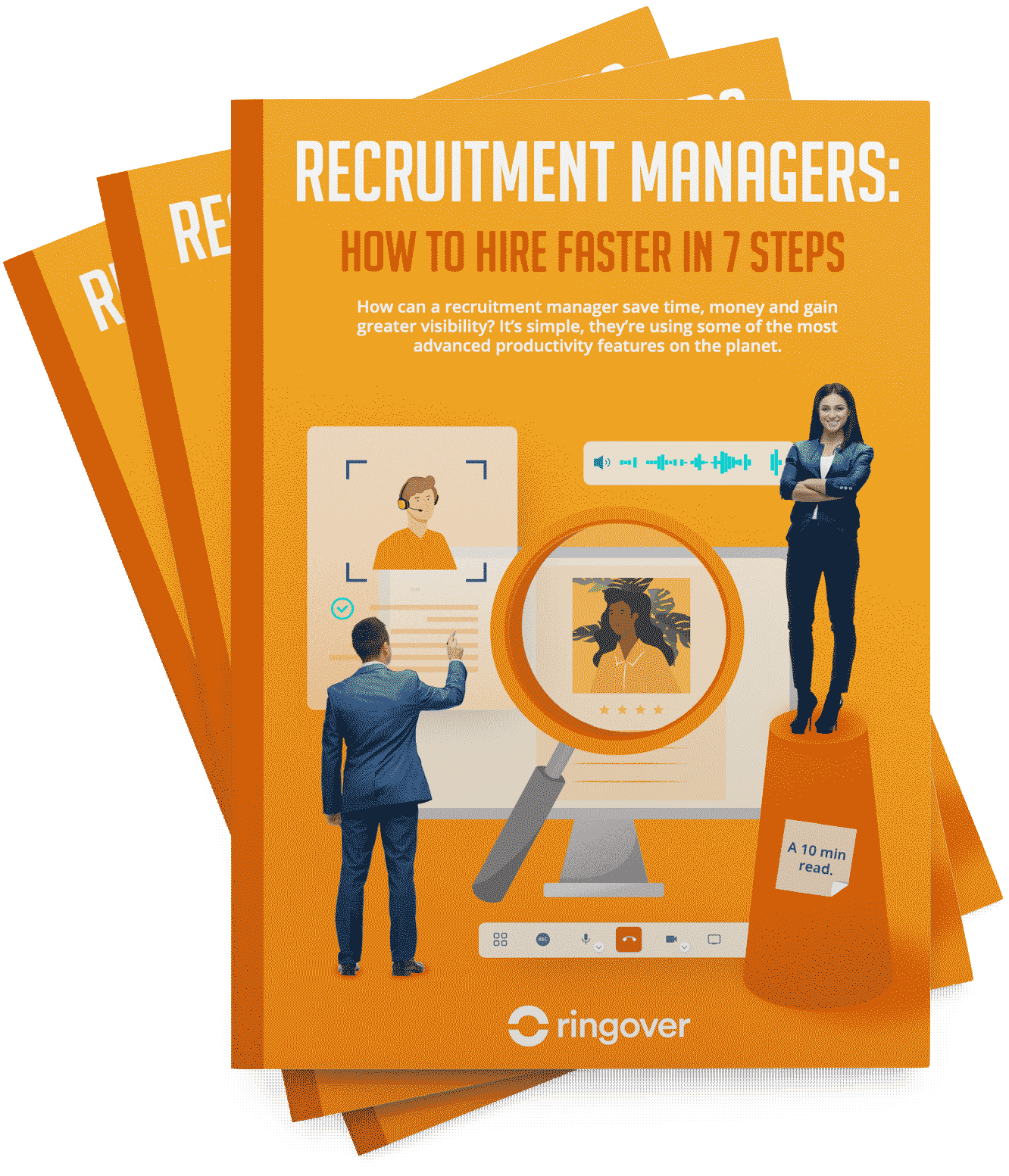Summary
In this guide, we will delve into the advantages of outsourced staffing versus traditional in-house staffing, helping you determine which solution aligns with your organisational goals. Plus, we'll take a look at how a business phone system like Ringover supports remote working, effective recruitment, and outsourced staffing operations. Whether you're running a small business, launching a startup, or leading a department within a large corporation, this article is designed to illuminate the benefits and challenges associated with staffing outsourcing, guiding you towards making an informed decision on how it can revolutionise your business operations.
Discover Ringover for Staffing10 benefits of outsourced staffing vs in-house staffing

Choosing between outsourced staffing and in-house staffing is a crucial decision for managing your organisation's human resources. Each approach offers distinct benefits and drawbacks, dependent on your company's objectives, financial constraints, and industry sector. Below, we explore 10 advantages of preferring outsourced staffing over its in-house counterpart:
1. Cost savings ✅
Outsourcing can significantly reduce expenses related to salaries, benefits, training, and overhead. You're able to pay solely for the services you require, precisely when you need them, bypassing the higher and fixed costs often associated with in-house staffing, which can negatively impact your bottom line.
2. Access to talent ✅
Outsourcing opens the door to a broader pool of qualified and experienced professionals ready to tackle diverse tasks and projects. It enables you to find the ideal candidates for the job, regardless of their geographic location, overcoming the potential talent limitations you might face with in-house staffing in competitive or specialised markets.
Plus, if you have a VoIP phone, staffing agents will have the technology available to reach out to candidates via their preferred channel thanks to omnichannel contact centre software. That's because omnichannel communications offers voice call, videoconference, text messages, email, and more. This variety of options improves the candidate experience, and centralises all call logs and interaction history in one spot so staffing agents can easily pick up a conversation even if they haven't spoken to the candidate previously.

3. Flexibility and scalability ✅
The outsourcing model affords you the flexibility to modify your staffing requirements in line with your business's fluctuating demands. It simplifies the process of scaling your labour force up or down without the headaches of hiring, layoffs, or retention. Conversely, in-house staffing necessitates more extensive planning and commitment owing to contractual and employee stability concerns.
4. Focus on core business ✅
Delegating non-essential or specialised tasks to external experts through outsourcing can free up your time and resources, allowing you to concentrate on your primary business functions. This approach can prevent the distractions associated with managing an in-house team, ensuring you remain focused on your core objectives.
5. Quality and efficiency ✅
Outsourcing assigns your projects to professionals equipped with the necessary skills, knowledge, and tools to execute them effectively, ensuring high-quality outcomes delivered promptly and within budget. In contrast, relying solely on an in-house team may compromise the quality and efficiency of your output if your staff lacks the requisite expertise or resources.
6. Risk management ✅
By opting for outsourcing, you minimise the risks linked to hiring, training, and retaining staff, such as legal disputes, compliance issues, and lawsuits. Additionally, it allows you to transfer portions of operational and financial risks to your outsourcing providers who bear responsibility for their employees' performance. In-house staffing, however, may expose you to greater risks that could harm your reputation and financial health.
7. Innovation and creativity ✅
Outsourcing exposes your business to fresh ideas and perspectives that can stimulate innovation and creativity. It affords you access to your outsourcing partner's best practices and cutting-edge technologies, which can significantly improve your offerings. Relying solely on in-house staff might stifle innovation if your team becomes mired in routine or complacency.
8. Customer satisfaction ✅

By delivering faster and superior services through outsourcing, you can boost customer satisfaction levels. This strategy enables you to meet your customers' expectations for quality, speed, and convenience and expand your market reach by attracting new segments. Conversely, in-house staffing may limit your ability to achieve the desired service quality or levels, impacting customer satisfaction.
9. Competitive advantage ✅
Outsourcing can provide you with a competitive edge by enhancing your value proposition to customers. It allows you to offer superior products and services at lower costs, differentiating you from your competitors. Furthermore, leveraging the expertise and reputation of your outsourcing partners can augment your brand image, a feat more challenging to accomplish with an in-house team that may lack equivalent capabilities.
10. Growth and expansion ✅
Outsourcing facilitates your business's growth and expansion by granting you access to new opportunities and markets. It enables you to augment your revenue and profitability by catering to a broader audience with an expanded range of products and services. Also, it strengthens your network and partnerships through collaborations with your outsourcing partners, a contrast to the limitations you might encounter with in-house staffing when managing increased workloads or operational complexity.
What is outsourcing in staffing?

Outsourcing in staffing is a strategic business approach where a company utilises a third-party organisation to handle tasks and activities traditionally managed by in-house staff. This method allows for the completion of certain organisational functions by experts outside of the company.
The motivations behind outsourcing in staffing are varied and numerous. Companies may opt for outsourcing to reduce costs, gain access to a broader talent pool, enhance flexibility and scalability, improve quality and efficiency, manage risks more effectively, foster innovation and creativity, increase customer satisfaction, gain a competitive edge, and support growth and expansion goals. It enables businesses to concentrate on their primary operations by entrusting non-core or specialised tasks to external professionals.
Depending on a company's specific needs and preferences, outsourcing in staffing can be approached in different manners. Some businesses may choose to outsource their entire recruitment process, whereas others may only outsource specific segments. Additionally, while some companies prefer to partner with a single service provider, others engage with multiple vendors to fulfil their staffing needs.
Companies also differ in their choice of outsourcing partners, with some opting for local or regional providers and others choosing global or offshore companies.
Differentiating itself from other outsourcing models, such as business process outsourcing (BPO) or traditional staffing companies, staffing outsourcing focuses purely on leveraging external capabilities for staffing needs. While BPO encompasses a wide range of outsourced business processes or functions, staffing outsourcing specifically targets the recruitment and talent acquisition aspect. Contrary to staffing companies that may only offer temporary or contract staffing solutions, staffing outsourcing seeks to provide strategic and comprehensive staffing services.
How to know if outsourced staffing is right for your business

Exploring the potential of outsourced staffing could be a game-changer for your business, yet it's not the universal solution for all. Deciphering its suitability for your business hinges on evaluating various elements, including your business objectives, budgetary constraints, industry landscape, and specific staffing requisites.
Reflect on these queries to gauge whether outsourcing your staffing aligns with your business needs:
- Is there a demand for specialised technology, know-how, or skills outside your realm of expertise? Outsourcing grants access to proficient experts equipped with the necessary tools and experience. This is particularly beneficial for areas demanding specific competencies like IT, accounting, or marketing. Should your in-house capabilities fall short, embracing outsourcing could represent a judicious move.
- Are you bogged down by tasks that are monotonous and time-intensive? Outsourcing can streamline your operations by taking charge of cumbersome responsibilities such as data entry, payroll, or customer support. By diverting these tasks, your team can redirect their focus towards more strategic and inventive undertakings.
- Does your staffing requirement fluctuate or exhibit seasonality? Outsourcing offers the flexibility to scale your workforce in alignment with your business fluctuations, eliminating the rigmaroles of recurrent hiring or terminations. Whether it's ramping up for peak seasons, special events, or scaling down during slower phases, outsourcing ensures you manage your staff levels efficiently, optimising costs and circumventing layoffs.
- Are you constrained by a lean budget or tight timelines? Outsourcing can deliver high-calibre work at reduced costs and accelerated timelines. It stands as a viable strategy for achieving your objectives within financial limits or stringent deadlines, without compromising quality or productivity.
- Seeking to mitigate your risks and liabilities? Outsourcing can diminish the hazards and liabilities tied to employee onboarding, training, and retention, ranging from legal entanglements, compliance breaches, to litigations. Opting to outsource can shift a portion of the accountability and responsibility to your outsourcing partner, who then assumes liability for their performance and outcomes.
If you find yourself nodding affirmatively to any of these considerations, outsourcing might just be the strategic move your business needs. Nevertheless, outsourcing is not devoid of challenges, and it's crucial to counterbalance its advantages against potential drawbacks before reaching a verdict. The ensuing section will delve into the disadvantages associated with outsourcing staffing, alongside strategies to navigate these hurdles effectively.
Conclusion
Outsourcing staffing emerges as a potent tactic to propel your business towards its goals, blessing you with a plethora of advantages. These include, but are not limited to, cost reductions, access to a broad talent pool, enhanced flexibility and scalability, improved quality and efficiency, effective risk management, fostering innovation and creativity, boosting customer satisfaction, securing a competitive edge, and supporting business growth and expansion.
Don't hesitate to reach out to us for a conversation on how staffing outsourcing can revolutionise your business operations. We offer an obligation-free consultation and a versatile pricing structure designed to fit your budgetary and business needs seamlessly. We eagerly anticipate the opportunity to collaborate with you.
Outsourcing Staffing FAQ
What is the difference between offshore staffing and outsourcing?
Outsourcing and offshore staffing represent two distinct approaches to engaging external services for completing tasks. Outsourcing involves the transfer of specific work to a third-party company, regardless of its geographic location. Offshore staffing refers to employing a third-party company based in a different country, often to benefit from lower labour costs or specialised skill sets.
For instance, when you engage a web development firm in India for your website project, you are both outsourcing your web development needs and offshoring to India. However, opting for a web development company within your country constitutes outsourcing without the offshoring aspect.
Conversely, employing a remote web developer from another country for your project denotes offshoring without actually outsourcing.
What are the 4 types of outsourcing?
There are four main categories of outsourcing, differentiated by location and the nature of the work outsourced:
- Onshore outsourcing: This involves outsourcing tasks to a third-party company located in the same country. For example, a US company outsourcing its accounting to another US-based firm.
- Offshore outsourcing: This type refers to outsourcing services to a company in a different country, such as a US company using a Philippines-based call centre for customer support.
- Nearshore outsourcing: This involves outsourcing work to a company in a nearby country, like a US company outsourcing software development to a firm in Mexico.
- Onsite sourcing: This occurs when you outsource tasks to a third-party company that sends its employees to work at your location, such as outsourcing IT support to a local IT firm whose technicians come to your office.
What is the meaning of RPO staffing?
RPO, or Recruitment Process Outsourcing, is a specialised solution wherein an external provider manages all or part of an organisation's permanent recruitment processes. It involves integrating project managers and recruiters within the company's HR function to optimise recruitment.
Unlike other outsourcing modalities like BPO (Business Process Outsourcing), which applies to a wide range of functions, or staffing companies focused primarily on temporary or contractual hiring, RPO provides a strategic approach to talent acquisition and recruitment.
RPO presents numerous advantages to businesses, including cost reductions, enhanced access to talent, increased flexibility and scalability, improved quality and efficiency, better risk management, fostering innovation and creativity, augmenting customer satisfaction, securing competitive edges, and supporting growth and expansion. It enables firms to concentrate on their core competencies while outsourcing non-core or specialist functions to experts.



